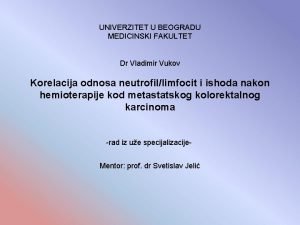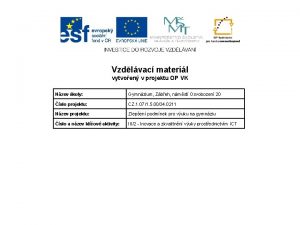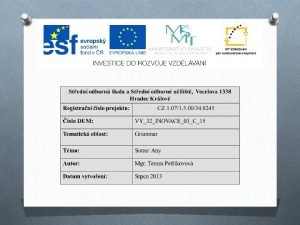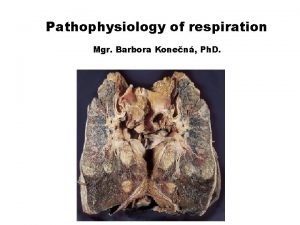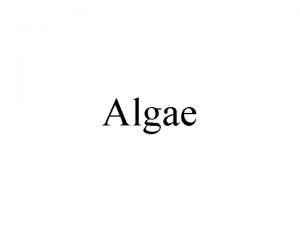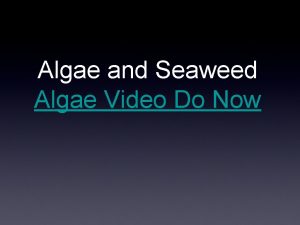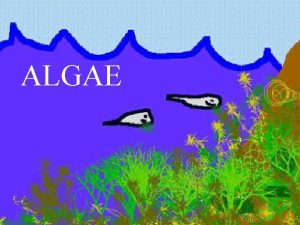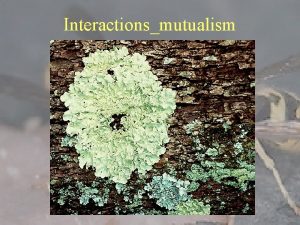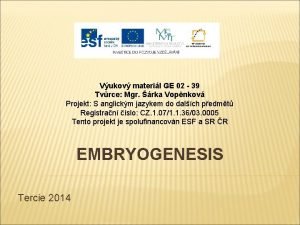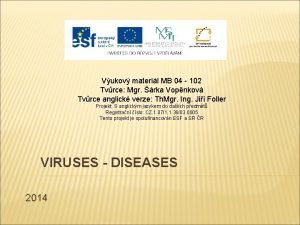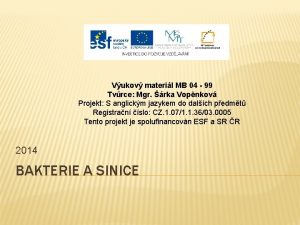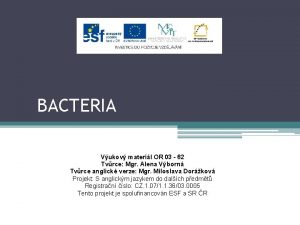ALGAE Vukov materil OR 03 65 Tvrce Mgr















- Slides: 15

ALGAE Výukový materiál OR 03 - 65 Tvůrce: Mgr. Alena Výborná Tvůrce anglické verze: Mgr. Miloslava Dorážková Projekt: S anglickým jazykem do dalších předmětů Registrační číslo: CZ. 1. 07/1. 1. 36/03. 0005 Tento projekt je spolufinancován ESF a SR ČR

ALGAE • Algae and blue-green algae are the oldest organisms on our planet • Autotrophic • Photosynthesis oxygen into the atmosphere • An eukaryotic type of a cell • The simplest plants • They mainly occur in water (freshwater, seawater), humid soil

ALGAE • They are an important part of food of aquatic animals • Some of them occur even on dry land (humid places) • a green cover on soil or bark • A diverse cell structure and a way of life • They differ in: ▫ Size ▫ Colour ▫ Body structure (a thallus)

ALGAE SIZE • microscopic • unicellular • multicellular up to 50 m COLOUR • green • red • brown THALLUS • unicellular • multicellular • fibrous

GREEN ALGAE • Predecessors of more developed plants • Seawater, freshwater and humid places • Some of them move thanks to flagellas

GREEN ALGAE • Chlorophyceae ▫ Unicellular ▫ Without a flagellum • Chlorophyta ▫ Unicellular ▫ Humid places

GREEN ALGAE • Euglena ▫ Unicellular ▫ Has a flagellum ▫ Mixotrophic (performs photosynthesis + accepts dissolved organic substances from the surroundings) • Volvox globator ▫ Unicellular ▫ Has a flagellum ▫ Makes colonies

Volvox globator • A colony of a volvox globator

Euglena • • A stigma Chloroplasts A nucleus A flagellum

MULTICELLULAR ALGAE • They are divided into several sections • They differ in: ▫ Thallus structure ▫ Way of reproduction ▫ Way of life

MULTICELLULAR ALGAE • They occur on rock coasts or freely in the sea: ▫ Brown algae ▫ Red algae • Some of them grow into big sizes • Usage : ▫ Feed ▫ Food ▫ Essences from algae are used for treatments

MULTICELLULAR ALGAE • • • The largest brown algae are: FUCUS (SEAWEED) In our country there occur these green fungi: SPIROGYRA (a spiral chloroplast) CLADOPHORA

MULTICELLULAR ALGAE – Thalli of sea algae visible just by an eye – red algae and seaweed

REVISION: • 1) Why are algae so important for us? • 2) Where do algae occur? • 3) The largest green algae are called: • 4) Which alga makes colonies?

Source: • DOBRORUKA, Luděk J. Přírodopis pro 7. ročník základní školy. 1. vyd. Praha: Scientia, 1998, 152 s. ISBN 80 -718 -3134 -4


